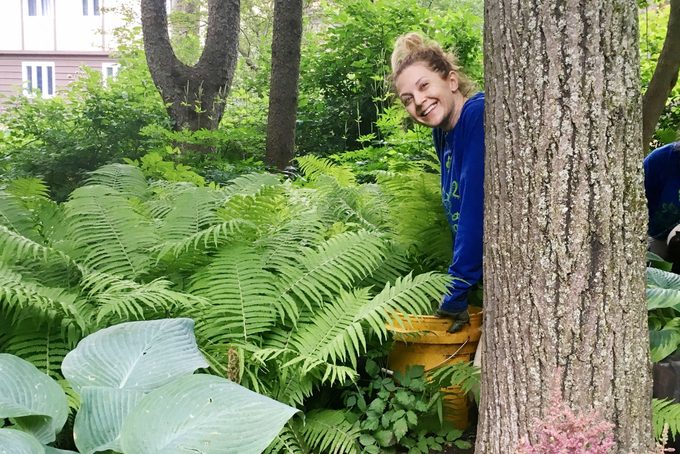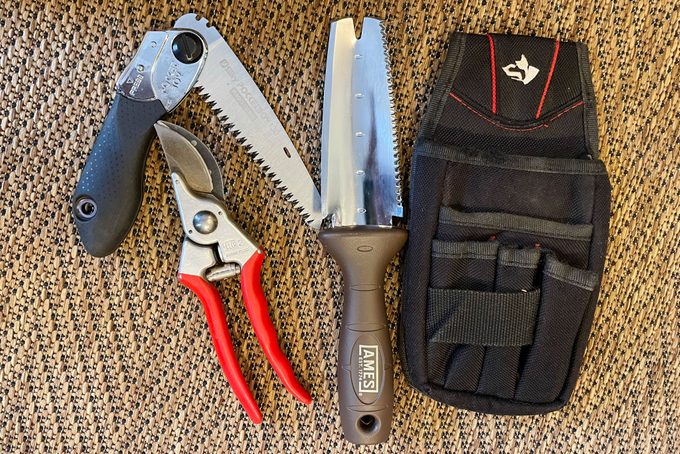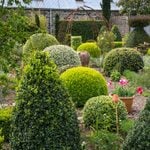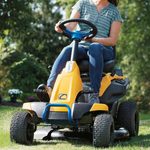The Eleven Percent: Meet Tami Gallagher, Master Gardener
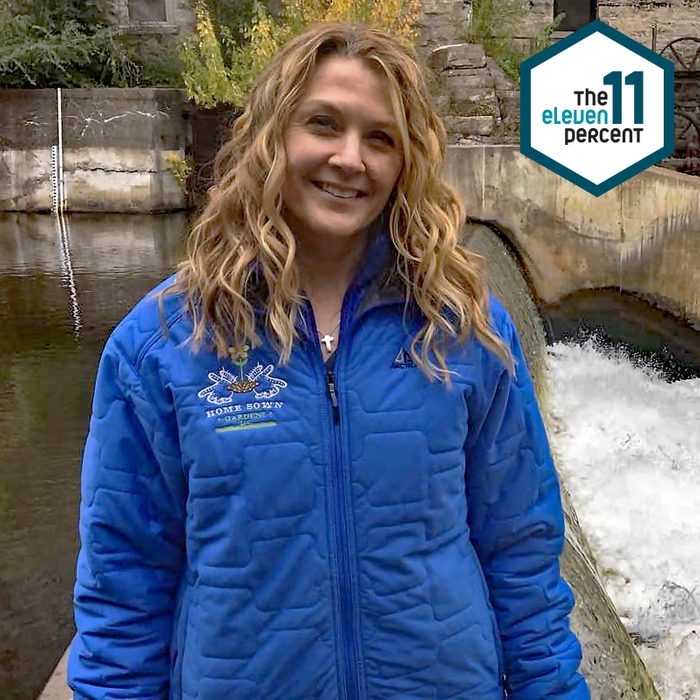
A professional organizer turned master gardener and business owner, Tami Gallagher talks about pollinators, sweat and what's in her tool bag.
Our editors and experts handpick every product we feature. We may earn a commission from your purchases.
This FH series introduces readers to a few of the women who make up 11 percent of the construction workforce in the U.S., highlighting stories of their careers in the field. Know someone we should feature? Email us here.
Tami Gallagher used to help people organize the inside of their homes. She did it so well that some of her clients suddenly had free time to focus on their yards. Then Gallagher discovered she was good at that, too. Before long she shifted her business to professional gardening services, following her natural love of plants and critters.
The transition didn’t happen overnight. She studied master gardening at the University of Minnesota and took as many horticulture and business classes as she could find. She found mentors through landscaping networking groups before taking the Minnesota Nursery and Landscape Association (MNLA) professional exam.
“There’s no comparison of being outside and physically working all day to being inside,” she says. “The beauty you’re surrounded with and the good you get to do in the world, I love it.”
Her Minnesota-based company, Home Sown Gardens, LLC, assists clients with garden maintenance and restoration and coaches neophyte gardeners through basic tasks. A MNLA award-winning company, Home Sown Gardens employs 10 full-time year-round staff and another 15 to 20 during the growing season. Gallagher spends many of her days weeding, pruning, transplanting and shoveling mulch.
Most of Gallagher’s clients are residential. Some are widows or suffer from chronic illnesses that prevent them from gardening. Besides the satisfaction of helping her clients, Gallagher enjoys having family around. Most of her six kids, plus her nephews and nieces, worked with her at one point or another.
“Those are some of my favorite days,” she says. “Even beyond teaching them nature and gardening, I think that the physical aspect of it, exposing them to blue-collar labor gives them the appreciation of working in a trade. Because we’re not always appreciated for that, right?”
We caught up with Gallagher for her thoughts on the state the professional gardening trade.
On This Page
Q: How has COVID affected your work?
A: It was a little scary for a while. A PPP [Paycheck Protection Program] loan kept us afloat. I’m so grateful that was available. We lost about a quarter of our clients because they lost their jobs and we’re a luxury service. But in 2021 we swung around again, gaining clients who were actually financially benefiting from COVID, like some who provide software and hardware for remote workers.
We’re also fortunate because we get to work outside, where we typically don’t need to wear masks. I am thankful because our employees and their families have stayed healthy. We made it. We made it through.
Q: Which gardening projects stand out to you?
A: The most memorable ones are when me and my crews work as a team, laughing and reenergizing one another. Some clients have pets we love working with. Sometimes we just stop and have a dance party, or get food. One day we bought frozen yogurt to celebrate National Cherry Jubilee Day. It was like 37 degrees out, but we were sitting outside, feeling happy.
The appreciation we get also makes projects memorable. I have had clients standing there with tears running down, thanking us for the beautiful spaces we’ve created. Especially with widows, the parallel healing that that happens with the gardens and them, as they’re grieving and moving forward in life, those make it so worth it.
We also get the immediate gratification of turning around a messy garden, and then delayed gratification seeing these gardens year after year and the benefits they bring from the love we put into them.
Q. What changes have you seen over the past 10 years?
A. There’s growing public awareness to be environmentally friendly, incorporating native plants, working with soil health and using fewer chemicals and fertilizers. People are also getting more intentional about what they want in a garden, whether it’s attracting pollinators or creating a place to sit and mediate, or somewhere to throw a frisbee with their kids.
In urban areas with tiny lots, people have to be very intentional about how they use space, so they are thinking that through more. I love the path it’s going, but there’s a little too much emphasis on attracting pollinators in their nectar-gathering stage, and forgetting about the rest of their lifecycles and the habitats and food they need for those.
Q. What are the pros or cons of being a woman master gardener?
A. The green industry, which we’re in, encompasses various segments like landscaping, tree care, irrigation, lawn care and golf courses. Those tend to be male-dominated, as does the leadership and the professional organizations that oversee the industry. But professional gardening is female-dominated, so we have to fight for our space.
I’d like to see more women join trade organizations and become active on committees and in leadership roles. Share their voices and perspectives. Be the leadership they want to see.
There’s also a perception that gardening is easy, unnecessary or non-essential; just a woman in her little straw hat with a watering can. So we fight the perception that we are not doing hard physical work. We get just as hot and sweaty and need to be as physically fit as everybody else in the industry.
I could hire more males if they thought it was more masculine, but they’re not applying as often. So that’s another challenge.
Q. Any advice for young women looking to be professional gardeners?
A. This is for you if you’re someone who enjoys hard work, isn’t afraid to sweat or be dirty, loves a “good tired” at the end of they day, enjoys science and wants to connect with the people you work with. There’s great joy from being outside and spreading beauty in the world.
Then, in life in general, be authentic. Don’t try to fit into any one mold. Just be you, and that will attract the things and people into your life that need to be there. Those are the relationships you should nurture; that’s what moves you forward. When you pursue your passion, those are going to come to you.
Q: What are your pro-specific tools?
A: My Husky tool pouch is attached to my belt at all times. In there I keep a Felco hand pruner, a Planter’s Pal trowel and a medium-tooth Silky folding saw. With those three tools I can accomplish about 75 percent of my day-to-day gardening tasks like weeding, pruning, deadheading and cutting plants back.
Another must are lightweight garden gloves that allow for dexterity but won’t blow a hole in the first hour. Then there are lightweight, waterproof Red Wing safety boots for stomping on shovels and walking miles. And my durable, leakproof HydroFlask water bottle that can get thrown around while keeping its contents at a consistent temperature.
Professional Gardener Tami Gallagher Bio
After her professional organizing business, Organized to the Core, uncovered the universal need for help with garden maintenance, Tami Gallagher switched gears and pursued her passion for outdoor beauty. From picking her dinner on the hobby farm she grew up on to being the owner of a professional gardening company, Tami has a lifetime of experience in the green industry.
Her company, Home Sown Gardens, has been serving the Twin Cities area of Minnesota since 2005. It offers custom, professional gardening maintenance solutions to benefit the community, the earth and the client, and has won the MNLA Excellence in Landscape Management Award numerous times.
Writer Karuna Eberl Bio
Karuna Eberl is a regular contributor to FamilyHandyman.com. She spent the last 25 years as a freelance journalist and filmmaker, telling stories of people, nature, travel, science and history. She has won numerous awards for her writing, her Florida Keys Travel Guide and her documentary, The Guerrero Project.

